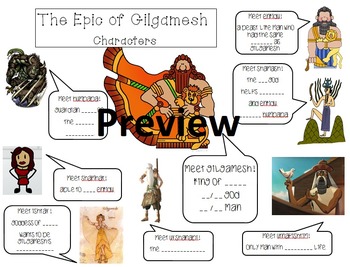


Finally, how do these interactions differ from the way in which Gilgamesh interacts with male gods in the Epic of Gilgamesh? These various interactions will be compared and analysed to reveal not only similarities and differences in the way Gilgamesh communicates with the goddesses in the Epic of Gilgamesh, but also crucial differences in the manner in which male and female deities reveal themselves and communicate with Gilgamesh. The Mesopotamian Epic of Gilgamesh is one of the oldest and most moving stories rooted in the ancient wisdom-tradition of mankind. Shamhat ( Akkadian:, romanized: amat also called Shamkat in the old Babylonian version of Gilgamesh' 1) is a female character who appears in Tablets I and II of the Epic of Gilgamesh and is mentioned in Tablet VII. In the epic, Gilgamesh is a demigod of superhuman strength who befriends the wild man Enkidu. But without the wandering, there would be no possibility for development, and Enkidu’s death would have left Gilgamesh. Without Enkidu’s death, there is no development. How do these goddesses reveal or present themselves to Gilgamesh? How do the goddesses communicate with Gilgamesh, and how does he interact with them? The manner in which these interactions take place in the Standard Version of the Epic will be compared to the same episodes in the earlier Old Babylonian Version of the Epic and the Sumerian narratives in order to identify changes across time. Tablet XI of the Gilgamesh epic introduces Utnapishtim, who, like Noah, survived cosmic destruction by heeding divine instruction to build an ark. By making Enkidu Gilgamesh’s friend, the composer has turned the Epic into a tale of growth-of discovery of humansuffering, limitation, death, and, finally, human meaning. He has given you power to bind and to loose, to be the darkness and light of mankind. Because of this do not be sad at heart, do not be grieved or oppressed. From The Epic of Gilgamesh,for example, we know something of the people who lived in the land between the Tigris and Euphrates rivers in the second and third millenniums BCE. The father of the gods has given you kingship, such is your destiny, everlasting life is not your destiny. Stories do not need to inform us of anything.

This article will investigate Gilgamesh's interactions and relations with these goddesses. Storytelling, the Meaning of Life, and The Epic of Gilgamesh Arthur A. In the Epic of Gilgamesh, Gilgamesh interacts with three goddesses: Ninsun, his mother and a goddess renowned for her wisdom, Ishtar, the goddess of love and sexuality, and Siduri, a minor goddess of wisdom.


 0 kommentar(er)
0 kommentar(er)
